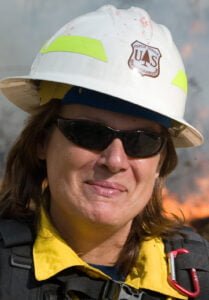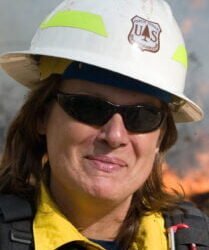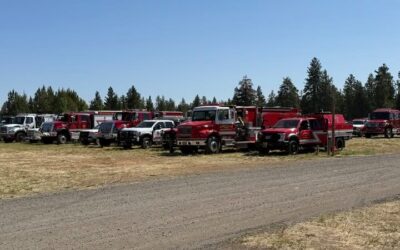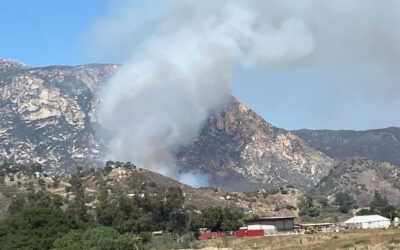Every one of us in the fire service has a desire to be a good leader. We all want to be, but sometimes the results are elusive. As much as we might want to be seen as that tough, rugged leader with our folks willing to follow us no matter what, the reality is often very different. It’s not for a lack of trying, but often times our leadership successes are just out of our reach.
Hopefully you’re taking the time to read articles and books on leadership and maybe pursuing leadership classes sponsored by your agency and NWCG. I started taking fire service leadership classes back in the 1980s. I’ve read the books and I’m still reading the books. After 40 plus years in the fire service, I’m still not an expert. But I do have a few suggestions for you. And they’re easy too.
If you’re a veteran firefighter and have been at it for many years, think about what it was like when you first started out. Now that you’ve been running a crew or engine for years, do you get impatient with the new firefighter on your crew? If you’re a battalion chief or higher, do you roll your eyes when the young enthusiastic firefighter or officer asks a lot of questions or makes too many suggestions? I know I used to.
First off, don’t squash enthusiasm. That’s pretty simple. It requires patience and an understanding of how the folks below you are looking towards your experience, knowledge and mentoring. Have you ever been a trainee working for a trainer who barely shared information with you? I have. I was working on my OSC1 taskbook and my trainer barely spoke to me. I spent a whole season on multiple two week assignments and I never got any feedback from him. How much effort would it have taken for him to offer his perspectives and thoughts? What can be more important for a leader than teaching your trainee. Don’t be that guy!
But even more important is to keep your eye on all the small things. I venture to guess that you all already know how to fight fires. You’re probably really good at the technical aspects of your job. Strategies, tactics, meteorology, fire ecology, land management principals… yea, there’s a lot to know. But what about the human element? How much time and effort do you spend on a fire assignment thinking about the simple things? The folks who work for you.
We should not be expected to just “shut up and dig” and be Pulaski motors anymore. If you feel this way, you missed the memo. And if we expect more than that from our folks, we have to improve our leadership skills. As I’ve mentioned in previous articles, we have to be self-aware leaders. Let me describe a couple of instances that a little bit of effort on my part paid dividends for the fire I was assigned to and to the greater wildland fire service.
Back in 1999, I was a Division Supervisor on a fire on the north rim of the Grand Canyon. It’s a beautiful area and the views from the north rim are beyond amazing. It’s one of the best places to view the canyon from. But my particular division was on top of the plateau away from the edge of the canyon. We were still working in beautiful country. Ponderosa Pine at the lower elevations, with Douglas fir, mixed conifer and patches of aspens along the upper portions of our fire lines. Pretty country and I was happy to be assigned to this early season fire.
On my division, I had 6 SRV (Snake River Valley) crews from the southern Idaho, eastern Oregon area and their STLs. These firefighters were casual hire ADs and only fought fires when the call came in. Otherwise, they might be working in the agriculture industry in Idaho and eastern Oregon. The SRV crews were well organized type 2 crews fully capable of mopping up and having a good attitude while doing it. As I walked my lines I’d make conversation with the firefighters asking how they were doing and if they were enjoying the area. Like I knew they would, they all expressed gratitude to be out on assignment and happy to be working.
After a few days of line holding, the mop-up began. I asked some of my firefighters if they had seen the Canyon yet. “No, no… are we close to the Grand Canyon?” I was appalled. “What?, You haven’t seen the Canyon yet?” They had been working within a mile or two of the north rim and yet didn’t even know it was there. They came in from the north on busses and were bussed from camp to the line and back every morning and evening. They were the proverbial mushrooms like we’ve all been, kept in the dark and fed “compost”.
I thought this was just too unfair. These hard working type 2 crews had come all the way from Oregon/Idaho and were a stone’s throw from one of the seven wonders of the world and were at risk of missing it entirely. If they hadn’t been such hard workers, with great attitudes, maybe I would have felt different. As it was, I had to do something for them. I coordinated with my neighboring division supervisors who also had multiple SRV crews working for them and we hatched a plan.
The next day at half hour intervals, ground support sent the busses to the appropriate drop point to pick up two crews per bus. They got dropped off at a nearby scenic overlook to spend 20 minutes or so ogling the canyon and taking pictures until their time was up. Then they got loaded back onto their bus as the next bus with crews showed up. Their Strike Team Leaders helped manage the logistics and the Division Supervisors and crews who were back on the line covered the line left by the crews visiting the canyon overlook.
Success. Everyone who came on those busses from 800 miles away would at least get to see the canyon they were working so hard to protect. Could I have done the same thing if we were actively fighting fire. Of course not. There are other factors that could have impeded that afternoon too. But be assured, the next day while those “mop shots” were digging out stump holes, gridding through the black and getting “black leg”, they had smiles on their faces while they sang their songs. They felt appreciated and valued. Appreciated and valued. Yes, we need to treat type 2 crews and everyone else on the fire like we value them and appreciate them too.
During that same season, I found myself as division supervisor on the side of a steep hot mountain. The division resources has been actively fighting fire, cutting line and deploying thousands of feet of hose. Of the 200 plus firefighters on that division, two crews were Cal Fire inmate crews. You all know those crews can be a mixed bag. Sometimes they’re good and sometimes… not so much. But I was impressed with their sheer desire to do a good job. They made it up and down that steep mountain side multiple times each day. It was hot, they were dirty and is often the case, the Cal Fire inmate crews were isolated from the federal and state non-inmate firefighters.
At the end of one shift as I dragged myself up that mountain for the last time that day, I made a point to walk with the inmate crews since I had already been talking to the government engine crews. It was the kind of hike where you take two steps up and slide down one. At first, you’re looking up to see how far the drop point is above you. But you finally quit looking up and just look at your dusty boots as you spend every bit of energy you have just to lift what feels like 50 pound boots up the mountain side.
When we got up that 1000’ climb, all the resources were pouring water over their heads and resting with their hands on their knees. They were beat. After they loaded up onto their crew buggies but before they left, I asked one of the Cal Fire crew captains if I could climb up into the buggies to thank their firefighters. The captains looked at me kind of funny but said, “if you want to, go ahead I guess.”
I climbed up into each of the two buggies for each crew. The inmate firefighters looked at me thinking this was a bit odd. But when they stopped talking, I took a few minutes to acknowledge the hard work they had done that day and what a bitch it was climbing up and down the side of the miserable hot mountain. “Excellent work gentlemen. You did outstanding today and I’m glad to have you on my division.” It sounded like balm to their souls. They started shouting praise for their crew, hooting and hollering and feeling affirmed that they were indeed bad ass firefighters.
The crew captains came over and thanked me. “No one has ever done that for them and they really did work hard today.” “No problem guys. Good work should be rewarded.”
How much did it cost me to climb up on to those crew buggies and say thank those inmate firefighters for their hard work? A minute per buggy? Not even.
Ok, the Grand Canyon tour entailed a few more details. But it was worth it. I believe I engendered loyalty and an improved attitude for those crews next fire assignment and their future division supervisors. How much work did that take? Not too much really. I might not see the direct pay off for my effort but the fire agencies will. It doesn’t take a lot of work. It mostly requires thinking about your folks. It means empathy. How would you feel if you were an inmate from prison assigned to a fire where you’re isolated from the other firefighters? What about being an agricultural worker, 800 miles from home and family at a place other people spend thousands of dollars to go see and you’re unable to get a glimpse of this natural wonder. How would that feel?
I know all of you have your own examples of those little leadership moments. I think the little ones can mean more than the big ones. Be the leader we all need and take care of your co-workers and firefighters. For an audio version of this story you can listen here, http://bobbieonfire.com/2021/01/22/64-leadership-little-things-have-a-big-impact/
Coming Soon
Both Sides of the Fire Line is Bobbie Scopa’s uplifting memoir of bravely facing the heat of fierce challenges, professionally and personally. It’s due out in September and available for preorder now.
Order from Amazon Order from Barnes & Noble

 Bobbie Scopa started her career as a seasonal firefighter in 1974. After graduating from Arizona State University, she went on to work in fire and natural resource management. Eventually she left the wildand agencies to work full time for a structure fire department. She finished her Masters in Forestry at NC State then went back to the US Forest Service and BLM eventually becoming the Assistant Regional Fire Director in Region 6. Bobbie has spent many years working as a type 1 and 2 Operations Section Chief. You can listen to Bobbie tell audio stories from her long career at BobbieOnFire.com. She has also recently completed her memoir titled “Both Sides Of The Fire Line”. It will be available through Chicago Review Press late summer of 2022.
Bobbie Scopa started her career as a seasonal firefighter in 1974. After graduating from Arizona State University, she went on to work in fire and natural resource management. Eventually she left the wildand agencies to work full time for a structure fire department. She finished her Masters in Forestry at NC State then went back to the US Forest Service and BLM eventually becoming the Assistant Regional Fire Director in Region 6. Bobbie has spent many years working as a type 1 and 2 Operations Section Chief. You can listen to Bobbie tell audio stories from her long career at BobbieOnFire.com. She has also recently completed her memoir titled “Both Sides Of The Fire Line”. It will be available through Chicago Review Press late summer of 2022.


